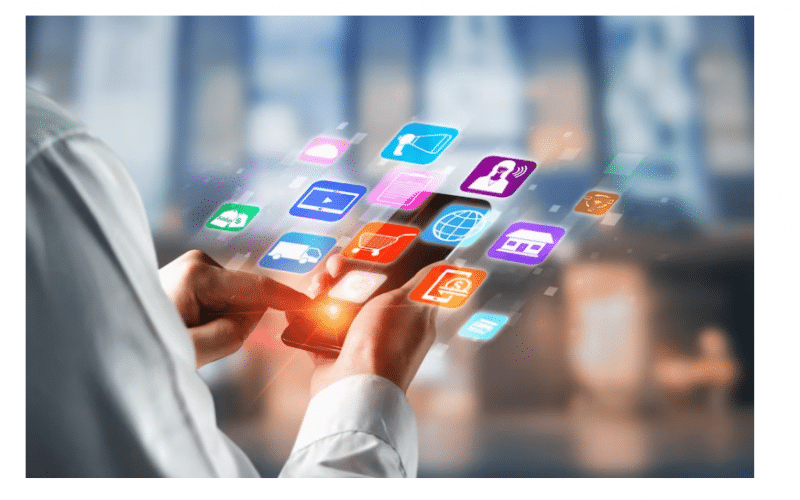What Are Digital Services?
Digital Services involve the electronic delivery of information across multiple platforms and devices, presenting it in an easy-to-understand manner. These services typically involve transactional services like passport renewals, driver’s license renewals, immigration forms, parking tickets, and hotel room reservations.
Furthermore, they are widely used in government circles to enhance citizen interaction and private sector productivity while improving customer experience.
What Is The Function Of Digital Services?
Effective digital services offer a full experience that benefits both service providers and customers. In other words, it involves ensuring that the products we deliver function properly for both end users and the individuals, procedures, and tech they support. The first step is to map the service, comprehend its various touch points, and determine the areas where technology can have the biggest influence.
Furthermore, to ensure that the solutions we deliver are efficient at scale, it also entails bringing stakeholders together to understand how the service functions as a whole and integrating government into the design process.
What Are The Benefits Of Digital Services?
Digital services offer improved internal productivity, efficiency, and collaboration among departments. They eliminate paper-based workflows, saving money and the environment. Additionally, firms can serve their customers better by doing more with less, and digital services increase transparency and improve relationships between companies and their customer base. This approach also reduces labor costs and paper usage, fostering a more efficient and environmentally friendly government.
Furthermore, traditional services involve paper-based workflows, limited insight into business processes, heavy investment, and limited access to reporting data.
What Are The Characteristics Of Digital Services?
#1. Intangibility
Digital services lack physical evidence, but environmental cues, known as “digital tangibles” influence customer quality perception. These cues help form initial perceptions, attitudes, and intent toward the service. Websites provide visual guidelines, while trust indicators like security certificates, feedback excerpts, and guarantees reduce the risk of purchasing a digital service.
#2. Invariance
Digital services can be standardized by quality and content, making standardization easier than high-touch services. This contrasts with the traditional belief that 100% quality cannot be engineered into service, especially when the definition is subjective. While providers offer 99.9% availability, it’s impossible to guarantee the customer experience, leading to confusion between customers and developers. It can be provided in advance and checked before delivery, resulting in a more consistent perception of quality by the end customer.
#3. High-tech
Digital services differ from face-to-face services due to their remote nature and lack of human touch. Customer interaction occurs through the application interface, with human touch supporting anonymity. Live-chat components enhance trust and human interaction. Digital service provision is location-independent, allowing firms to serve unlimited customers anytime. Shifting from a process-centric approach to an industrialized approach is crucial for enhancing the customer experience and trust.
#4. Scalability
Digital services offer economies compared to traditional services, requiring scaling to meet increased demand. Scalable digital services have unlimited seats, eliminating the need for additional action from service providers. Additionally, they can address customer service requests through digital means like FAQ sections, knowledge bases, discussion forums, and peer-to-peer support.
Maintaining low incremental customer requests is crucial to avoiding poor service and potential dissatisfaction. Development and design processes, including testing, are essential for customer satisfaction and low human touch.
What Are The Types Of Digital Customer Service?
#1. Graphic Design
If graphic designers offer high-quality services, they rarely have trouble finding employment. All over the world, brands are searching for new logos and other brand components, infographics, or photo editors. Even those who work with Printify to run a print-on-demand company frequently need new and original designs.
#2. Copywriting
Learning to copywrite is challenging due to the significant role each word plays in a copy’s effectiveness. A lackluster copy, especially when limited, is unlikely to yield results. A good copywriter earns significant money, making the effort worthwhile.
#3. Customer Support
Online stores struggle to meet customer requests due to increased online shopping, prompting customer support departments to hire new employees for potential profit opportunities.
#4. Virtual Assistant
To avoid deadlines, consider seeking help from virtual assistants on platforms like Freelancer and UpWork. These platforms offer gigs for freelancers, allowing users to explore their suitability for virtual assistant roles.
#5. Translating
Translate multiple languages for online income by contacting translation agencies to inquire about remote work opportunities.
#7. Content Writing
Writing good content is not everyone’s cup of tea, but having a writing talent can generate income through blog articles, social media posts, emails, and ghostwritten books.
#8. Data Entry
Data entry jobs are an excellent option for those with limited experience, as they require research skills and are available on freelancer platforms, similar to virtual assistant gigs.
Expand your digital service offering by learning about social media platforms. Start your page and grow organically, or work for established brands managing their social media accounts. Note that social media managers create content, interact with audiences, run ad campaigns, and explore new opportunities for collaboration.
#10. Affiliate Marketing Network
Affiliate marketing continues to make money for those who choose the method, thanks to Amazon, ClickBank, and other reliable affiliate programs.
Start an affiliate website, network yourself, or consult others after you gain some experience with the method.
#11. Dropshipping
Choose an evergreen niche and explore dropshipping for potential income. The project’s success depends on effort and time, and it offers valuable learning experiences and extra income. This experience can be applied to e-commerce business consulting.
#12. Search Engine Optimization
SEO services are in high demand as brands strive to rank on search engines. Learning SEO takes time, but if you’re serious about committing to a new craft, SEMrush is an insightful tool for keyword analysis.
#13. Video Editing
Video editors polish videos on platforms like YouTube, Vimeo, and social media, ensuring they are ready for consumption. As a video editor, you can contribute to creating the best possible content.
#14. Web Development
Web developers are essential for website development and security, as they excel in post-launch tasks like plugin development and website security. Additionally, well-versed developers easily find work offering digital services, making them valuable assets on various platforms like WordPress and Shopify.
What Are Digital Goods And Services?
Digital goods are products and services created, distributed, and consumed digitally. By the end of the twentieth century, there were only a few digital products, such as games and articles. However, the internet and advancements in technology have made digital products more popular. To sell digital goods, one must create or acquire the rights to sell an existing digital product through a licensing agreement.
Additionally, selling digital goods requires several steps, including:
- Purchasing a digital product
- Establish the cost
- Creating an e-commerce website
- Product promotion
- Delivery of the product
- Providing customer service
A digital platform marketplace is essential for selling goods, offering features like product descriptions, pricing, and delivery options. Large digital goods merchants can invest in research and development, promoting high-quality products. However, these platforms can also face challenges like piracy, copyright infringement, tax evasion, and fraud.
What Is A Digital Service Product?
A digital product is a non-physical asset or service sold digitally, including software, applications, eBooks, videos, photography, PDFs, and zip files, excluding real-life products.
What Are The New Digital Services?
Digital services are business constructs that enable consumers to engage with entities like businesses through processes and flows. Online shopping is a prime example of a digital service that shapes the user’s digital experience.
What Is A Digital Service Strategy?
A digital service strategy maximizes business benefits from data assets and technology-focused initiatives, requiring a cross-functional team with executive leadership, marketing, and IT members.
What is Amazon Digital Services?
The Amazon Digital Service is a platform by Amazon where you can buy and download digital products or content that you subscribe to. These products include books, music, TV shows, movies, and podcasts. Note that these contents are accessible through your phone, computer, or tablet.
Other digital services of this nature include Apple, Spotify, Microsoft, and Netflix.
What is Marketing Digital Services?
Digital marketing, also known as online marketing, is the promotion of businesses and brands to connect with their potential customers via the Internet. This includes email, text messages, web-based advertising, and social media.
What is Digital Services Act?
The Digital Services Act is an EU regulation that updates the Electronic Commerce Directive from 2000 about illegal content, clear advertising, and misinformation. It was submitted along with the Digital Markets Act by the European Commission to the European Parliament and the Council on December 15, 2020.
Digital Marketing Services: 21+ Digital Marketing Agencies
DIGITAL MARKETING COMPANY: Best Agencies & Services Review 2023
INTERNET MARKETING SERVICE: Top 17+ Best Digital Marketing Services 2023
PRODUCT BACKLOG: Product Backlog Meaning, Importance & Examples






